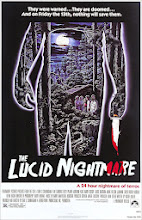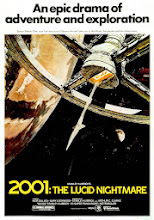Portrait of Jennie
Director: William Dieterle
Year 1948
Portrait of Jennie is a haunting and beautifully constructed film that showcases an extraordinary story of love crossing space and time. Set during the Depression in New York City, the film follows the down and out starving artist Eben Adams as he struggles with finding buyers for his paintings, while at the same time desperately searching for his inspirational muse. The look of the city at this time period, along with the hazy black and white imagery provided by director William Dieterle, allows for a perfect set up for this fantasy laced love story. Portrait of Jennie really is a classic gem of cinema's yesteryear, that transcends the span of over six decades, yet still feels fresh and relevant to this day.
 |
| Matthews is alright, but Spinney is a real asshole. |
The entire plot of Portrait of Jennie is a tightly packed mystery that really has to be experienced first hand to get the full impact of what is truly happening on screen. At risk of ruining the initial impact of the story, I'll just give you a short set up of what the film is all about. Eben Adams, played by the outstanding Joseph Cotten in one of his greatest roles ever, has a strange meeting with a young girl named Jennie Appleton in Central Park that surprisingly turns his world upside down. This impactful meeting brings on a revelation within Eben and suddenly he unexpectedly begins to flourish as an artist gaining reputation among his newfound and highly distinguished art dealer client. The most uncanny thing about this strange situation, is that the young girl that skyrocketed his inspirational muse seems to age in leaps and bounds each time Eben sees her. Who is Jennie and why does she seem displaced in time, always talking about the future? The set up is brilliant and it will force you to plunge in head first, in order to solve the mystery.
 |
| Don't go into the light Caroline! Stay out of the light! |
 |
| Bigfoot takes a stroll through Central Park. |
 |
| Earth to Jennie. Man, what a space case. |
By emphasizing on this strong connection between actors, he in the process enunciates the larger then life love both Jennie and Eben have for each other in the story. Through this act we are given an overwhelming hand in believing this fantastical tale that could bridge kindred souls and connect them from different times, both changing their lives and the people around them. Dieterle deserves a large portion of the credit, because it takes a real genius to know what your films strong points are and then focus in on them, letting it shape and craft the movie into something heartfelt and memorable. His subtle and keen eye brings this film to life.
 |
| The loneliest man in the world. |
There's a great mixture of a handful of genres throughout this film and the blending of all of these elements mix quite flawlessly. With the Portrait of Jennie, we are given a love story that melds traditional elements of mystery, horror, fantasy, and drama, and then creates something entirely unlike any of those separate genres. One could say that Portrait of Jennie is in a genre of its own, because when you analyze each segment of the categories that I mentioned above, you can't pinpoint a single one within the story. Each combines so delicately into the fabric of the narrative, that they begin to play off each other, morphing into a melting pot of ideas. The end result is something that defies logic, making it impossible to pin down. The ambiguity of it all is really what is most appealing about the film. It creates such a believable world out of such unbelievable material, that it boggles the mind when trying to rope in the individual elements of this complicated recipe of a film. Portrait of Jennie is definitely a unique beast.
 |
| What's wrong Jennie? Do you have to go potty? |
To top it all off, the story has so many highs and lows within its intricate subtext, that you really feel like you've been riding an emotional roller coaster by the end. The vividness of these temperamental sentiments is excruciatingly real, torn right from the pages of the human subconscious. We strive over the loss of love that Eben feels as he desperately tries to find the captivating women that entered his life in such an abrupt manner. We swoon over the reunion of these star crossed lovers as again and again they manage to find each other against such insurmountable odds. This mental tug of war packs a significant punch, lifting up the film from being just another run of the mill love story, and catapults it up into the minds of the audience as an experience that we are sharing with the two main characters. By the end you feel as if you've been on a life changing journey and that's not something you can say that occurs often with your typical contemporary film.
 |
| What? You thought you weren't gonna get to see the portrait? |
Drawing on these impactful components, Dieterle plays with the notion of stylistic images and familiar visual cues and begins to alter our perception of the two. Much like his combination of genre narratives, he toys with the iconography of what we've come to expect from each classification of film. Like combining the haunting imagery of a dusk filled winter landscape juxtaposed against Jennie's delicate and beautiful form as it walks off into the sunset. Dieterle also uses an abundance of Film Noir aesthetics, casting a very shadow filled palette over the world that he's created. This works well off of his Noir elements that tend to creep up every so often as the story progresses. The despair that is felt in the major portions of this piece, are heavy and overbearing, making it that much more enlightened when a romantic segment comes into light, embracing us and propelling us into what would normally seem like a totally different movie. Instead, the night and day aspects of this film, defy the odds and coexist on a plain unparalleled within the cinema world.
 |
| Hold me like you did back on Naboo. |
 |
| Joseph Cotten stumbles onto the set of Japanese Horror flick, Uzumaki. |
This unbridled notion that if you capture an audience and make them believe that what they are seeing is something that they are truly experiencing, is a feat that isn't easily achieved, but one that Dieterle has managed to master within the context of Portrait of Jennie. So confident is he, that he throws such a mind-blowing visual curve ball our way, as in the example of colorizing the finale, that you really have to admire the boldness of the effort. Taking such strikingly abrasive techniques and inspiring visual cues to strengthen the overall feel of this epic story shows just how confident Dieterle was on the overall pull that he had garnered over the course of the film's run time. A truly inspiring move for a truly inspiring film.
 |
| Well isn't that as pretty as a picture. |
Portrait of Jennie, much like its heroine, is way ahead of its time. Fortunately for the films sake, it was appreciated in its own time and at the same time is still a relevant piece of work that can be loved for generations to come. The film has so much substance to it, that you can feel the weight of all it has to say within its expressive and fleeting moments. Portrait of Jennie only exists over a span of a few moments in reality, but through the same unconventional and otherworldly connection that occurred between its main characters, this amazing story will last within the minds of its audience for a lifetime and dare I say an eternity. This film is highly recommended for anyone who loves the power of cinema and the wonderful stories that it can bring into our lives.
5 out of 5 stars An Amazing Story of Love Defying Time

























































































No comments:
Post a Comment